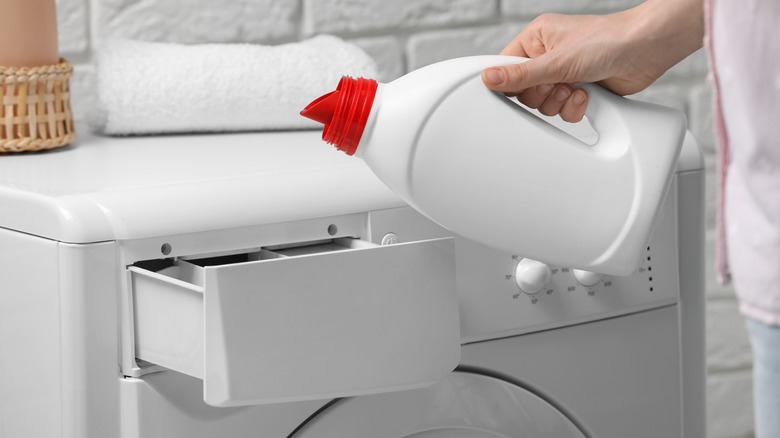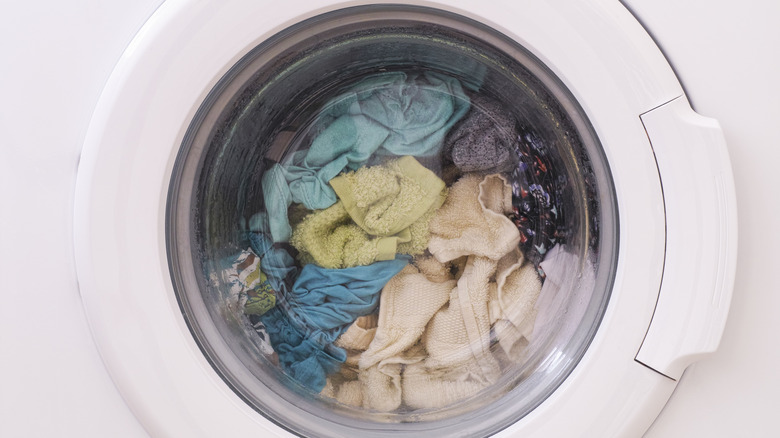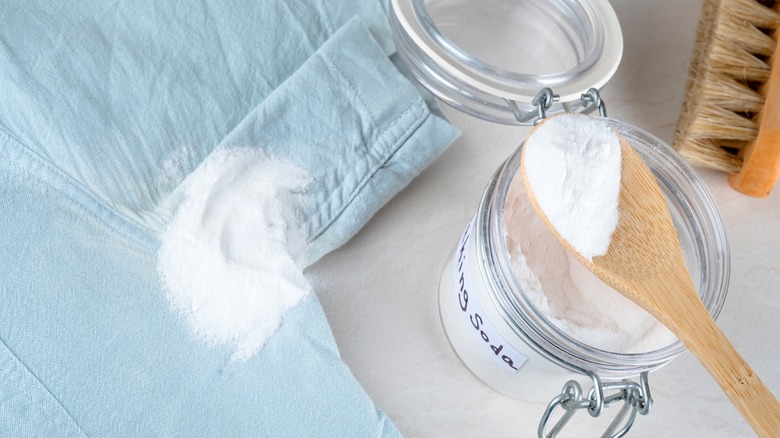Is It A Good Idea To Use Ammonia In Your Laundry Routine? Here's What Our Laundry Expert Says
There are certain laundry stains that are notoriously difficult to remove. While a ketchup stain might just need some stain remover, blood stains will need a little more finesse. Grease and oil stains are also tricky to remove, and if they settle into the fibers, they will create a permanent dark spot that will be hard to ignore. Because of this, you might be tempted to reach for ammonia in your laundry routine. The harsh cleaner is known to lighten yellowed stains and is efficient at removing tough splotches like blood and grease. But is it a good idea to use it? We asked an expert to get to the bottom of the question once and for all.
Zachary Pozniak, COO of Jeeves New York, which provides dry cleaning, laundry, alteration, and restoration services, exclusively tells House Digest that while it might be effective, it's unnecessary. Ammonia can help whiten clothes and erase tricky stains, but so can many other cleaners—specifically cleaners that aren't as dangerous to handle. Ammonia can harm your skin, irritate your eyes, and become poisonous when mixed with other cleaners. When considering all of these potential dangers, Pozniak recommends choosing something gentler to clean your laundry. Here is a closer look into why.
Why you shouldn't use ammonia in your laundry
First thing is first: It's true that ammonia is effective. It's so effective that it's probably in some of your laundry products. "Ammonia is the base chemical in many protein stain removers. It works well on 'from the body' stains," Pozniak exclusively tells House Digest. It's also a mild whitener but not as strong as bleach. It's also true that it can help make your detergent more powerful. "Ammonia will also boost the effectiveness of laundry detergents, but I don't think it is a necessary additive with how well high-quality laundry detergents work," he explains.
While it might sound like a helpful laundry aid, it's a relatively dangerous product to work with. If you're not careful, you can end up hurting your skin or, worse, creating a hazardous mixture without even knowing it. "Ammonia and chlorine bleach CANNOT be used at the same time or MIXED; it creates a poisonous gas," Pozniak warns. "Ammonia can irritate the eyes and skin if not handled properly (wear gloves when using.) For these reasons and the strong odor of ammonia, I do not suggest its use in home laundry." That's why you should stop using ammonia immediately in your laundry routine.
What to use instead of ammonia
You might think you need to reach for toxic laundry room staples to erase stubborn stains, but plenty of other cleaning agents can produce the same results without the risks. "I would suggest your laundry booster formula as a substitute," Pozniak shares with House Digest exclusively. This booster will help turbo-charge your detergent, effectively removing stains, whitening clothes, and making them feel cleaner. All you will need are all-natural ingredients like baking soda and borax.
"Our recipe is two-parts washing soda, one-part baking soda, one-part borax, and one-part sodium percarbonate. Add ¼ cup of this mixture to the basket of your washing machine before adding your clothes," Pozniak explains. Since baking soda has a pH of 8, it raises the pH of water, making it easier to remove stains like coffee and wine. Washing soda is a little harsher than baking soda, so it's used as a stain remover for tougher splotches, like ones made from body oils or grease. Borax, on the other hand, is great for whitening whites or brightening colors, and sodium percarbonate, or oxygen bleach, does both things, meaning it whitens and tackles tricky stains. Add all four ingredients together, and you will have enough cleaning power to leave your bottle of ammonia behind.


